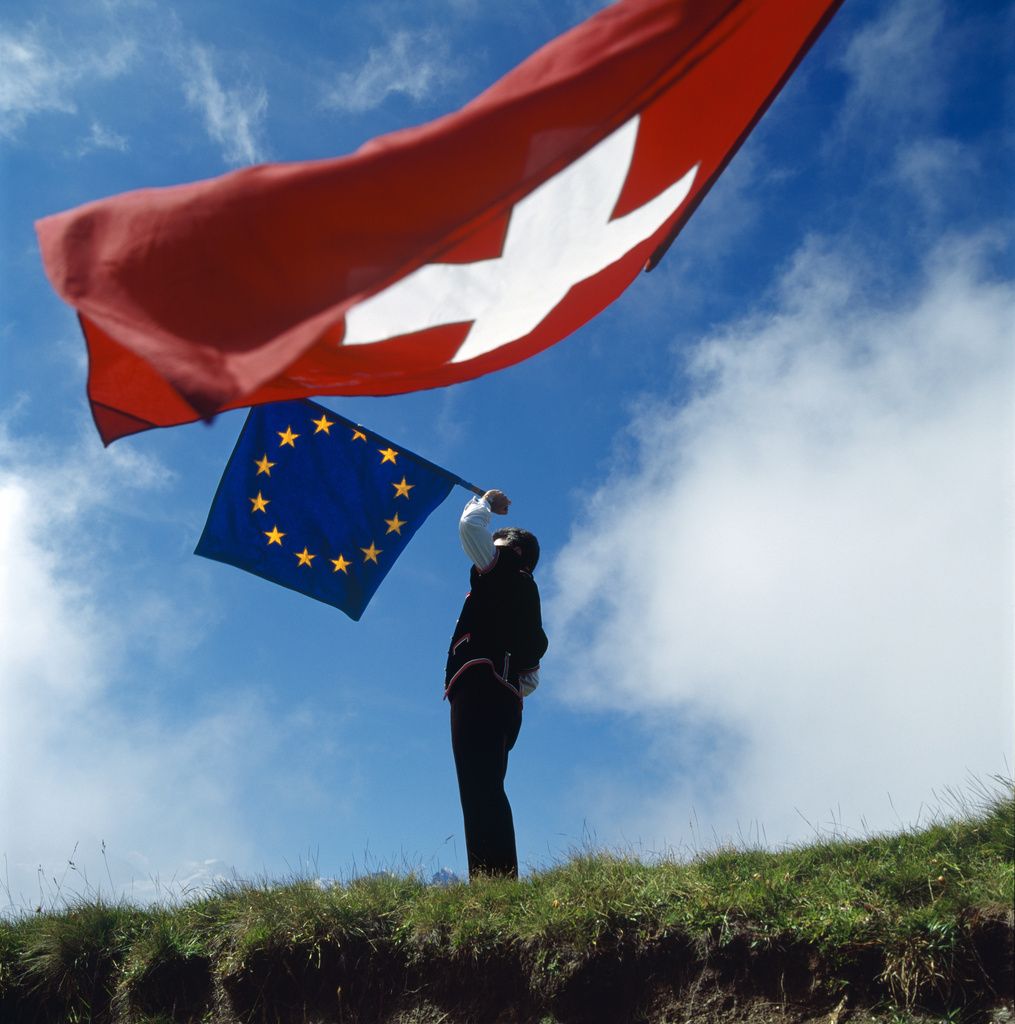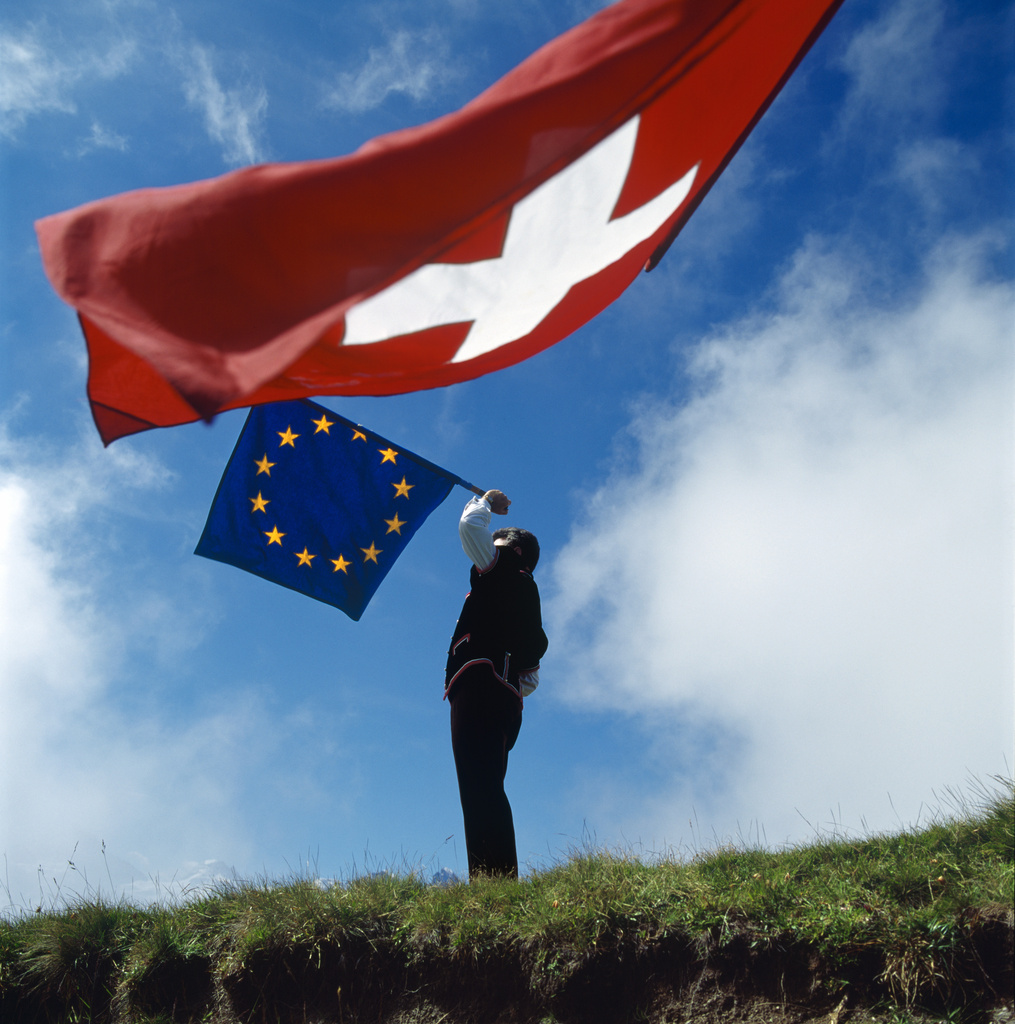Swiss business dismisses EU membership

Switzerland should resist continued calls to sign up fully to the European Union, according to a report from the country’s business lobby group.
But the banking community now appears ready to explore the extension of bilateral ties to include financial services to avoid being frozen out by the threat of increasingly protectionist EU regulation.
The report by the Swiss Business Federation, economiesuisse, that was released in Zurich on Tuesday, ruled out the prospect of Switzerland becoming a full member of the EU or withdrawing entirely from the Eurozone.
Switzerland has negotiated a series of bilateral agreements with the EU since voters turned down the prospect of joining the European Economic Area in 1992. The treaties include participation in the free movement of workers between states and the single-border Schengen zone.
A further vote against opening talks for EU membership in 2001 reinforced Switzerland’s bilateral position. But expansion of the EU zone and criticism of the Swiss financial and tax regimes have put further pressure on Switzerland to become full members.
“Losing influence”
EU ambassador to Switzerland, Michael Reiterer, said in a recent speech that the future for Swiss youngsters “lies in Europe”. British parliamentarian Denis MacShane, a member of the All Party British-Swiss Parliamentary Group, this year warned that Switzerland is losing influence by staying out of the EU.
But the resolve of voters would hardly be tested by events in Europe that have seen the euro currency dive and credit problems lead to a rescue package being put together to prop up indebted countries. In the last few months, the isolated Swiss economy has performed far better than any Eurozone country.
Economiesuisse believes the Swiss economy would be better served by continuing on the bilateral path even without the present difficulties in Europe. The lobby group’s report warned against an increase of regulation and costs coupled with a loss of political autonomy should Switzerland join the EU.
Switzerland’s low cantonal tax rates that attract foreign enterprises away from European countries could also be under threat with full membership as the EU has openly criticised the strategy as being uncompetitive.
The report also identified a weakening of business links and domestic productivity should Switzerland now sever bilateral links and go it alone completely.
Cherry picking?
Economiesuisse director Pascal Gentinetta rejected criticism that Switzerland is cherry picking the best parts of the EU.
“The bilateral path is in the mutual interest of both parties,” he told swissinfo.ch. “The commercial balance of trade is in favour of the EU [a €17.6 billion or SFr24.7 billion trade surplus of goods for the EU in 2008].”
“It makes sense for Switzerland to adapt to European rules in certain areas and to retain its autonomy in such economic decision-making domains as monetary and fiscal policy.”
Economiesuisse reiterated past calls to further extend bilateral ties in the area of energy trading, agriculture, regulation of the chemical and pharmaceutical sectors and the trade of general services.
But it also appears that Switzerland could be poised to tackle the thorny issue of harmonising the trade of financial services with the EU. This has previously been a no-go area as compromise over areas such as banking secrecy and the exchange of tax information appeared unlikely.
Obstacles remain
However, with the EU now contemplating new laws that could squeeze out competition from non-member states, particularly in the field of alternative investments, Switzerland has a new incentive to engage with Europe in this sector.
“The Swiss economy has an interest in opening up the market for financial services,” Claude-Alain Margelisch, deputy chief executive of the Swiss Bankers Association, told journalists in Zurich on Tuesday.
“An integrated Swiss finance sector would strengthen Europe’s competitiveness with the large and dynamic finance sectors of the Americas and Asia,” he added.
A new desire to explore financial services cooperation may exist, but Gentinetta made it clear that the obstacles along that path remain difficult to negotiate.
“It would be important to respect our wish not to agree to an automatic exchange of information [in cases of foreign tax-evasion investigations] and our desire to keep our own regulatory authority,” he told swissinfo.ch. “We have never said never, but this would only work if we could find common interests.”
Matthew Allen, swissinfo.ch
Switzerland is not a member of the EU, but has signed more than 20 major bilateral treaties with the Eurozone.
Swiss voters turned down joining the European Economic Area – a halfway house to EU membership – in 1992 and nine years later they also rejected the idea of Switzerland opening talks to become a full EU member.
Switzerland has lodged an application with Brussels to join the EU but it has been put on ice.
The first set of Swiss-EU bilateral agreements came into force in 2002, including the free movement of EU and Swiss workers between borders and other trade and transport issues.
A second set of treaties, that included Switzerland subscribing to the Schengen/Dublin accords, were signed in 2004 and approved by Swiss voters the following year.
Voters also approved the expansion of the labour accords to the ten new EU states in 2005 and in 2009 to continue the accord while extending it to Bulgaria and Romania.
However, the relationship between Switzerland and the EU is not always cordial. Brussels is opposed to Switzerland’s corporate tax regime that allows cantons to set low rates to attract holding companies or regional HQs from other countries.
Several EU member states vociferously denounced Switzerland’s banking secrecy code that restricted the exchange of information in international tax evasion investigations. Last year, Switzerland gave ground, but not sufficiently enough for some countries.

In compliance with the JTI standards
More: SWI swissinfo.ch certified by the Journalism Trust Initiative





You can find an overview of ongoing debates with our journalists here. Please join us!
If you want to start a conversation about a topic raised in this article or want to report factual errors, email us at english@swissinfo.ch.